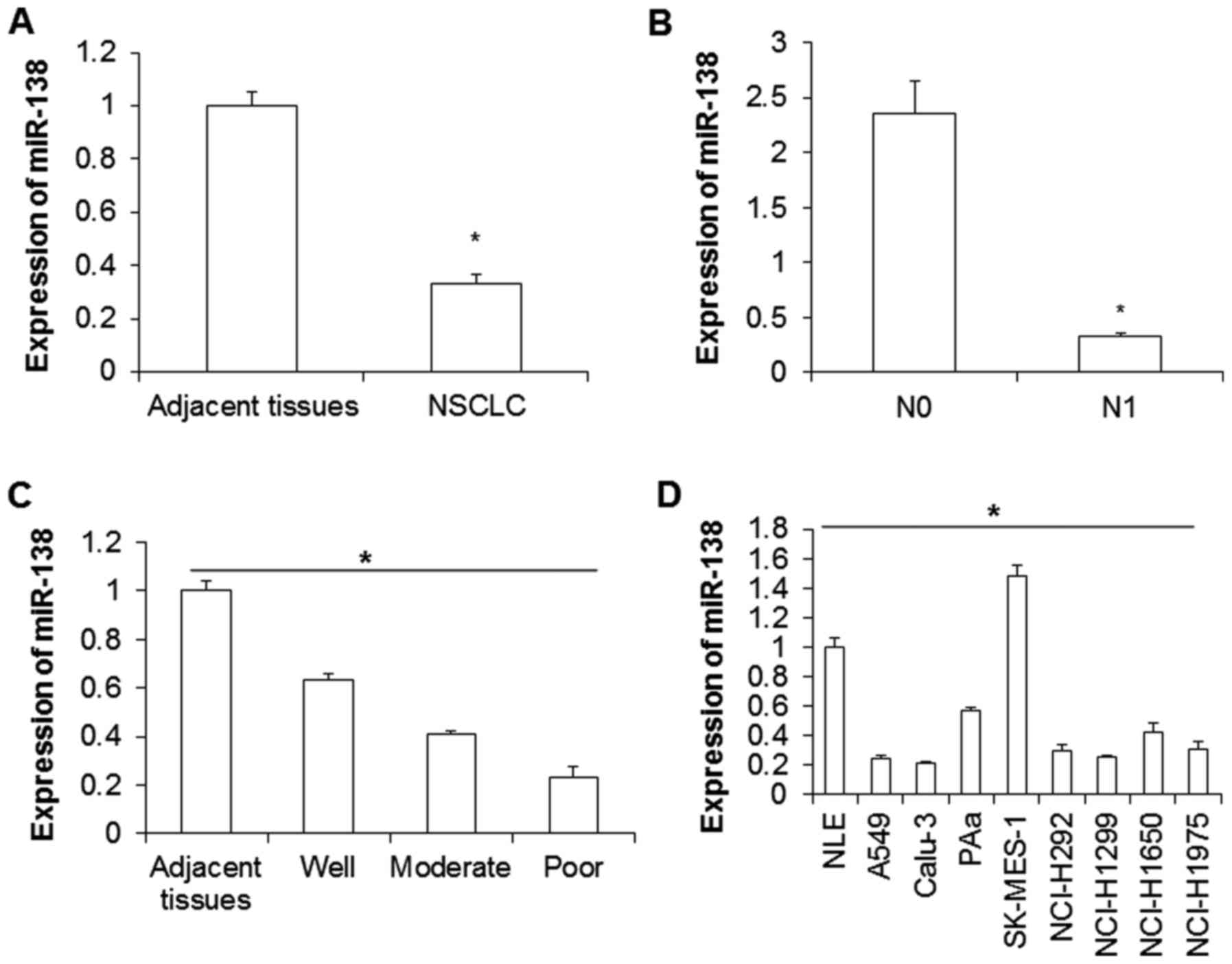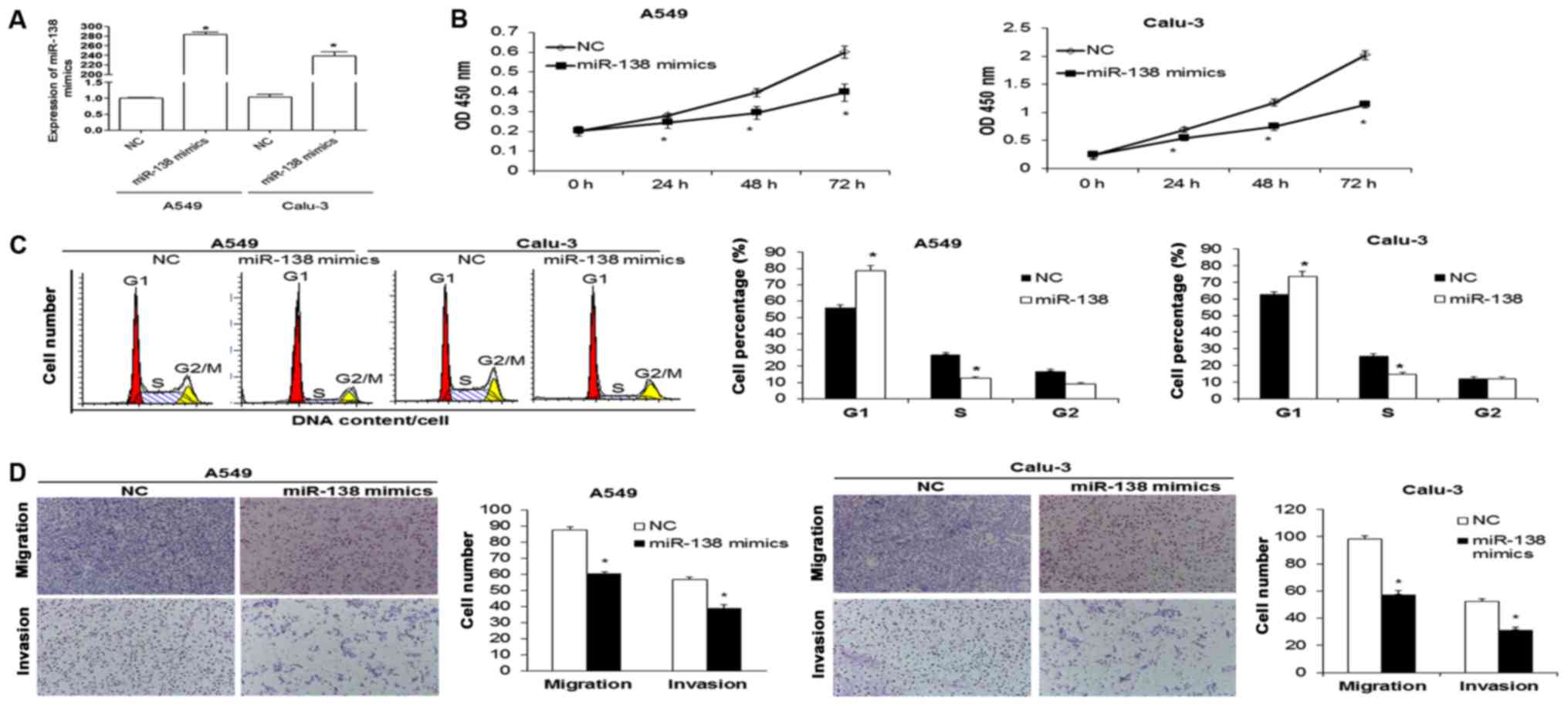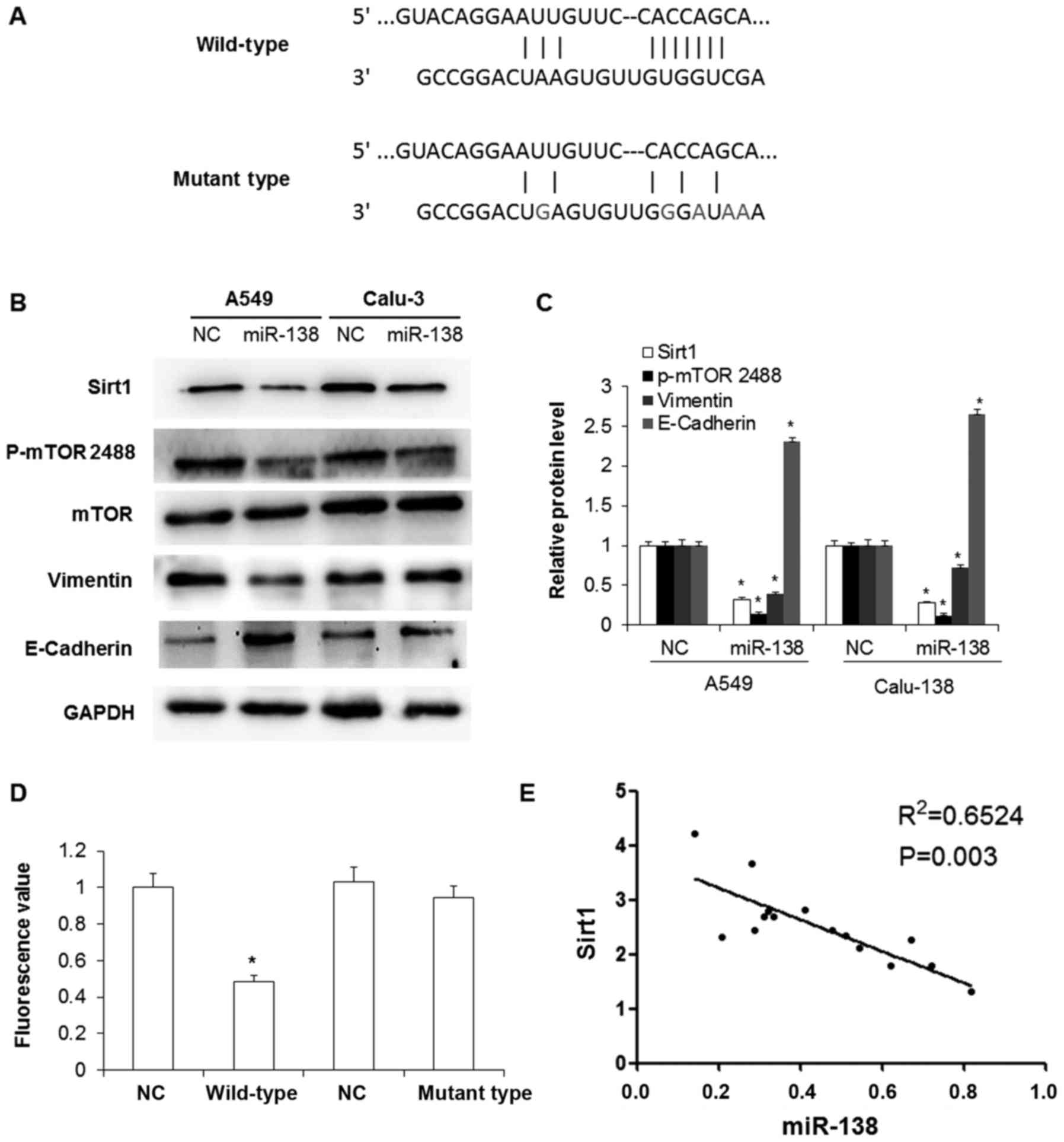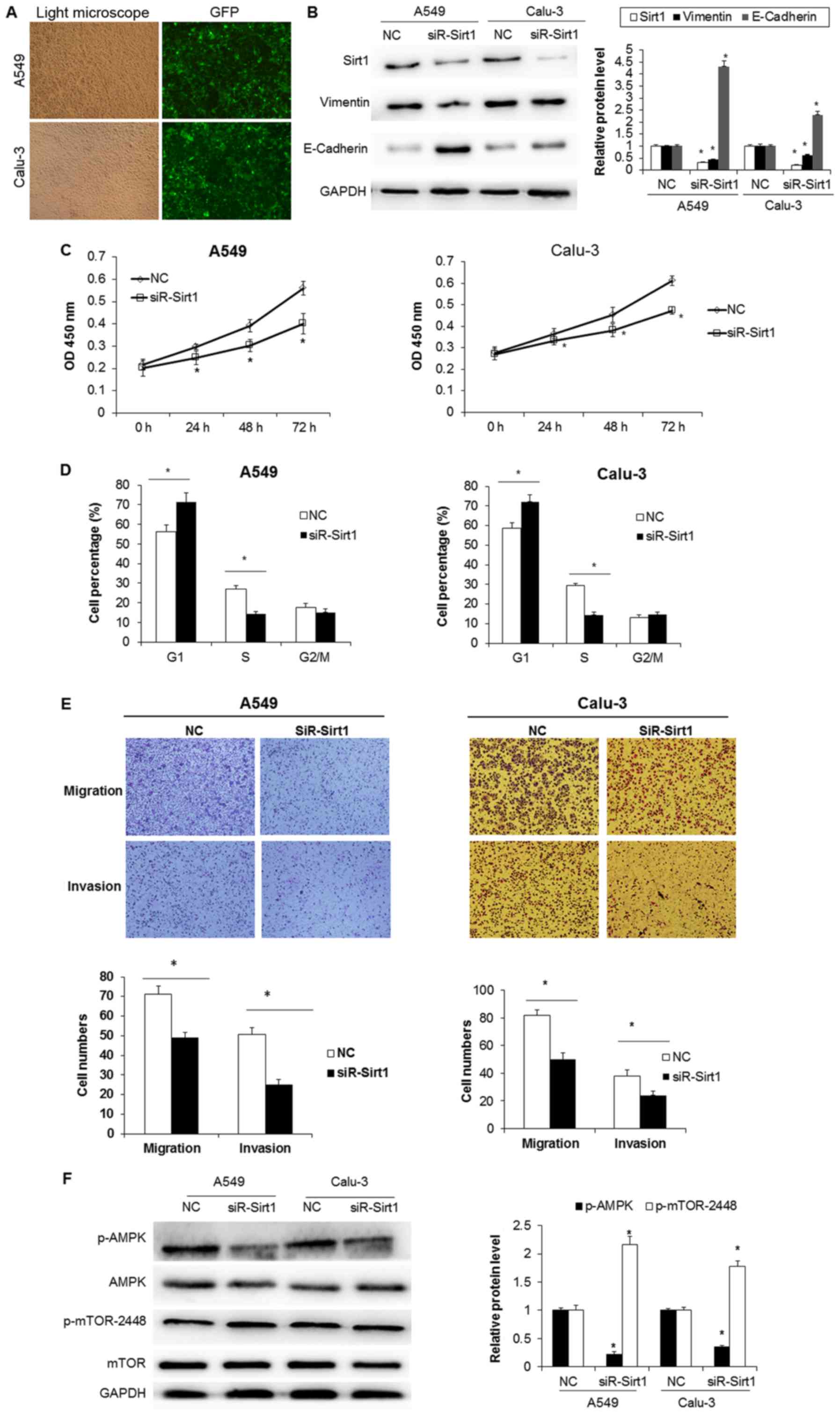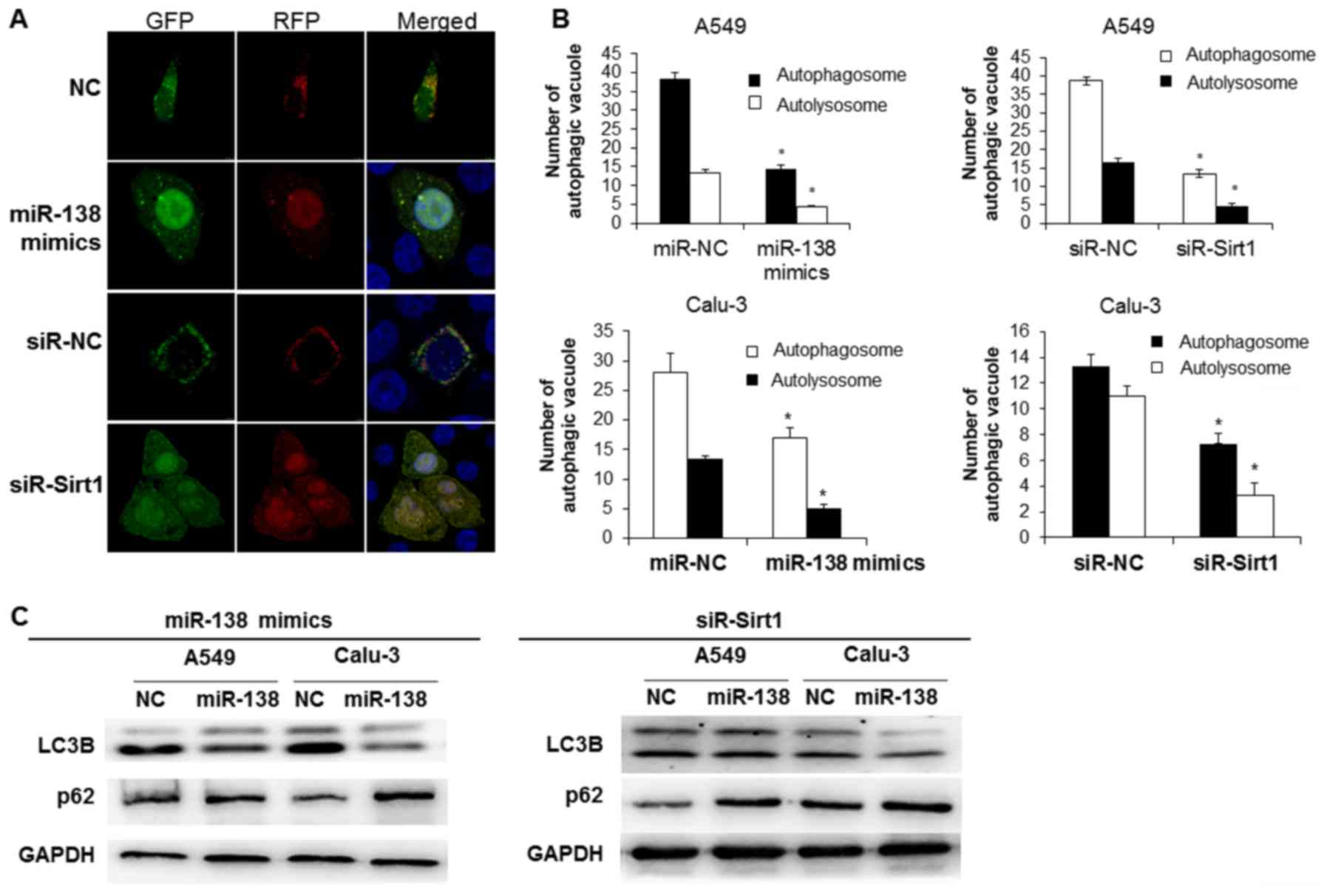|
1
|
Constanzo JD, Tang KJ, Rindhe S, Melegari
M, Liu H, Tang X, Rodriguez-Canales J, Wistuba I and Scaglioni PP:
PIAS1-FAK interaction promotes the survival and progression of
non-small cell lung cancer. Neoplasia. 18:282–293. 2016. View Article : Google Scholar : PubMed/NCBI
|
|
2
|
Moores SL, Chiu ML, Bushey BS, Chevalier
K, Luistro L, Dorn K, Brezski RJ, Haytko P, Kelly T, Wu SJ, et al:
A novel bispecific antibody targeting EGFR and cMet is effective
against EGFR inhibitor-resistant lung tumors. Cancer Res.
76:3942–3953. 2016. View Article : Google Scholar : PubMed/NCBI
|
|
3
|
Casaluce F, Sgambato A, Sacco PC,
Palazzolo G, Maione P, Rossi A, Ciardiello F and Gridelli C:
Resistance to crizotinib in advanced non-small cell lung cancer
(NSCLC) with ALK rearrangement: mechanisms, treatment strategies
and new targeted therapies. Curr Clin Pharmacol. 11:77–87. 2016.
View Article : Google Scholar : PubMed/NCBI
|
|
4
|
Shen H, Cao Y, Li X, Tan Y, Chen J, Yang
Z, Kong Y and Yuan Y: Surgical intervention improves survival for
metastatic non-small cell lung cancer patients. Medicine
(Baltimore). 95:e38002016. View Article : Google Scholar : PubMed/NCBI
|
|
5
|
Zhou J, Song XB, He H, Zhou Y, Lu XJ and
Ying BW: Prevalence and clinical profile of EGFR mutation in
non-small-cell lung carcinoma patients in Southwest China. Asian
Pac J Cancer Prev. 17:965–971. 2016. View Article : Google Scholar : PubMed/NCBI
|
|
6
|
Zequn N, Xuemei Z, Wei L, Zongjuan M,
Yujie Z, Yanli H, Yuping Z, Xia M, Wei W, Wenjing D, et al: The
role and potential mechanisms of LncRNA-TATDN1 on metastasis and
invasion of non-small cell lung cancer. Oncotarget. 7:18219–18228.
2016.PubMed/NCBI
|
|
7
|
Wang B, Ding W, Zhang M, Li H, Guo H, Lin
L, Chen J and Gu Y: Role of FOXO1 in aldosterone-induced autophagy:
A compensatory protective mechanism related to podocyte injury.
Oncotarget. 7:45331–45351. 2016.PubMed/NCBI
|
|
8
|
Bah A, Lacarrière C and Vergne I:
Autophagy-related proteins target ubiquitin-free mycobacterial
compartment to promote killing in macrophages. Front Cell Infect
Microbiol. 6:532016. View Article : Google Scholar : PubMed/NCBI
|
|
9
|
Barnard RA, Regan DP, Hansen RJ, Maycotte
P, Thorburn A and Gustafson DL: Autophagy inhibition delays early
but not late stage metastatic disease. J Pharmacol Exp Ther.
358:282–293. 2016. View Article : Google Scholar : PubMed/NCBI
|
|
10
|
Song L, Liu S, Zhang L, Yao H, Gao F, Xu D
and Li Q: MiR-21 modulates radiosensitivity of cervical cancer
through inhibiting autophagy via the PTEN/Akt/HIF-1α feedback loop
and the Akt-mTOR signaling pathway. Tumour Biol. 37:12161–12168.
2016. View Article : Google Scholar : PubMed/NCBI
|
|
11
|
Li Q, Liang X, Wang Y, Meng X, Xu Y, Cai
S, Wang Z, Liu J and Cai G: miR-139-5p inhibits the
epithelial-mesenchymal transition and enhances thechemotherapeutic
sensitivity of colorectal cancer cells by downregulating BCL2. Sci
Rep. 6:271572016. View Article : Google Scholar : PubMed/NCBI
|
|
12
|
Momtazi AA, Derosa G, Maffioli P, Banach M
and Sahebkar A: Role of microRNAs in the therapeutic effects of
curcumin in non-cancer diseases. Mol Diagn Ther. 20:335–345. 2016.
View Article : Google Scholar : PubMed/NCBI
|
|
13
|
Tomasetti M, Amati M, Santarelli L and
Neuzil J: MicroRNA in metabolic re-programming and their role in
tumorigenesis. Int J Mol Sci. 17:pii: E7542016. View Article : Google Scholar
|
|
14
|
Azizian A, Gruber J, Ghadimi BM and
Gaedcke J: MicroRNA in rectal cancer. World J Gastrointest Oncol.
8:416–426. 2016. View Article : Google Scholar : PubMed/NCBI
|
|
15
|
Bao L, Lv L, Feng J, Chen Y, Wang X, Han S
and Zhao H: miR-487b-5p regulates temozolomide resistance of lung
cancer cells through LAMP2-medicated autophagy. DNA Cell Biol.
35:385–392. 2016. View Article : Google Scholar : PubMed/NCBI
|
|
16
|
Tomasetti M, Staffolani S, Nocchi L,
Neuzil J, Strafella E, Manzella N, Mariotti L, Bracci M, Valentino
M, Amati M, et al: Clinical significance of circulating miR-126
quantification in malignant mesothelioma patients. Clin Biochem.
45:575–581. 2012. View Article : Google Scholar : PubMed/NCBI
|
|
17
|
Nyhan MJ, ODonovan TR, Boersma AW, Wiemer
EA and McKenna SL: MiR-193b promotes autophagy and non-apoptotic
cell death in oesophageal cancer cells. BMC Cancer. 16:1012016.
View Article : Google Scholar : PubMed/NCBI
|
|
18
|
Li J, Xia W, Su X, Qin X, Chen Y, Li S,
Dong J, Ding H, Li H, Huang A, et al: Species-specific mutual
regulation of p53 and miR-138 between human, rat and mouse. Sci
Rep. 6:261872016. View Article : Google Scholar : PubMed/NCBI
|
|
19
|
Jiang B, Mu W, Wang J, Lu J, Jiang S, Li
L, Xu H and Tian H: MicroRNA-138 functions as a tumor suppressor in
osteosarcoma by targeting differentiated embryonic chondrocyte gene
2. J Exp Clin Cancer Res. 35:692016. View Article : Google Scholar : PubMed/NCBI
|
|
20
|
Li B, Yang XX, Wang D and Ji HK:
MicroRNA-138 inhibits proliferation of cervical cancer cells by
targeting c-Met. Eur Rev Med Pharmacol Sci. 20:1109–1114.
2016.PubMed/NCBI
|
|
21
|
Melloni G, Muriana P, Bandiera A, Fontana
R, Maggioni D, Russo V, Doglioni C and Zannini P: Prognostic role
of liver X receptor-alpha in resected stage II and III
non-small-cell lung cancer. Clin Respir J. Jul 12–2016.(Epub ahead
of print). doi: 10.1111/crj.12522. View Article : Google Scholar : PubMed/NCBI
|
|
22
|
Qin Q, Wei F, Zhang J, Wang X and Li B:
miR-134 inhibits non-small cell lung cancer growth by targeting the
epidermal growth factor receptor. J Cell Mol Med. 20:1974–1983.
2016. View Article : Google Scholar : PubMed/NCBI
|
|
23
|
Talero E, Alcaide A, Ávila-Román J,
García-Mauriño S, Vendramini-Costa D and Motilva V: Expression
patterns of sirtuin 1-AMPK-autophagy pathway in chronic colitis and
inflammation-associated colon neoplasia in IL-10-deficient mice.
Int Immunopharmacol. 35:248–256. 2016. View Article : Google Scholar : PubMed/NCBI
|
|
24
|
He Q, Sha S, Sun L, Zhang J and Dong M:
GLP-1 analogue improves hepatic lipid accumulation by inducing
autophagy via AMPK/mTOR pathway. Biochem Biophys Res Commun.
476:196–203. 2016. View Article : Google Scholar : PubMed/NCBI
|
|
25
|
Ji L, Li L, Qu F, Zhang G, Wang Y, Bai X,
Pan S, Xue D, Wang G and Sun B: Hydrogen sulphide exacerbates acute
pancreatitis by over-activating autophagy via AMPK/mTOR pathway. J
Cell Mol Med. 20:2349–2361. 2016. View Article : Google Scholar : PubMed/NCBI
|
|
26
|
Xiao L, Zhou H, Li XP, Chen J, Fang C, Mao
CX, Cui JJ, Zhang W, Zhou HH, Yin JY, et al: MicroRNA-138 acts as a
tumor suppressor in non small cell lung cancer via targeting YAP1.
Oncotarget. 7:40038–40046. 2016.PubMed/NCBI
|
|
27
|
Sun DK, Wang JM, Zhang P and Wang YQ:
MicroRNA-138 regulates metastatic potential of bladder cancer
through ZEB2. Cell Physiol Biochem. 37:2366–2374. 2015. View Article : Google Scholar : PubMed/NCBI
|
|
28
|
Jin Z, Guan L, Song Y, Xiang GM, Chen SX
and Gao B: MicroRNA-138 regulates chemoresistance in human
non-small cell lung cancer via epithelial mesenchymal transition.
Eur Rev Med Pharmacol Sci. 20:1080–1086. 2016.PubMed/NCBI
|
|
29
|
Tan Y, Hu H, Tan W, Jin L, Liu J and Zhou
H: MicroRNA-138 inhibits migration and invasion of non-small cell
lung cancer cells by targeting LIMK1. Mol Med Rep. 14:4422–4428.
2016.PubMed/NCBI
|
|
30
|
Tian XF, Ji FJ, Zang HL and Cao H:
Activation of the miR-34a/SIRT1/p53 signaling pathway contributes
to the progress of liver fibrosis via inducing apoptosis in
hepatocytes but not in HSCs. PLoS One. 11:e01586572016. View Article : Google Scholar : PubMed/NCBI
|
|
31
|
Wang Y, Bi Y, Chen X, Li C, Li Y, Zhang Z,
Wang J, Lu Y, Yu Q, Su H, et al: Histone deacetylase SIRT1
negatively regulates the differentiation ofinterleukin-9-producing
CD4+ T cells. Immunity. 44:1337–1349. 2016. View Article : Google Scholar : PubMed/NCBI
|
|
32
|
Ye Z, Fang J, Dai S, Wang Y, Fu Z, Feng W,
Wei Q and Huang P: MicroRNA-34a induces a senescence-like change
via the down-regulation of SIRT1 and up-regulation of p53 protein
in human esophageal squamous cancer cells with a wild-type p53 gene
background. Cancer Lett. 370:216–221. 2016. View Article : Google Scholar : PubMed/NCBI
|
|
33
|
Liu L, Liu C, Zhang Q, Shen J, Zhang H,
Shan J, Duan G, Guo D, Chen X, Cheng J, et al: SIRT1-mediated
transcriptional regulation of SOX2 is important for self-renewal of
Liver cancer stem cells. Hepatology. 64:814–827. 2016. View Article : Google Scholar : PubMed/NCBI
|
|
34
|
Shen ZL, Wang B, Jiang KW, Ye CX, Cheng C,
Yan YC, Zhang JZ, Yang Y, Gao ZD, Ye YJ, et al: Downregulation of
miR-199b is associated with distant metastasis in colorectal cancer
via activation of SIRT1 and inhibition of CREB/KISS1 signaling.
Oncotarget. 7:35092–35105. 2016.PubMed/NCBI
|
|
35
|
Huffman DM, Grizzle WE, Bamman MM, Kim JS,
Eltoum IA, Elgavish A and Nagy TR: SIRT1 is significantly elevated
in mouse and human prostate cancer. Cancer Res. 67:6612–6618. 2007.
View Article : Google Scholar : PubMed/NCBI
|
|
36
|
Stünkel W, Peh BK, Tan YC, Nayagam VM,
Wang X, Salto-Tellez M, Ni B, Entzeroth M and Wood J: Function of
the SIRT1 protein deacetylase in cancer. Biotechnol J. 2:1360–1368.
2007. View Article : Google Scholar : PubMed/NCBI
|
|
37
|
Vaziri H, Dessain SK, Ng Eaton E, Imai SI,
Frye RA, Pandita TK, Guarente L and Weinberg RA:
hSIR2SIRT1 functions as an NAD-dependent p53
deacetylase. Cell. 107:149–159. 2001. View Article : Google Scholar : PubMed/NCBI
|
|
38
|
Leung WK, Wu MS, Kakugawa Y, Kim JJ, Yeoh
KG, Goh KL, Wu KC, Wu DC, Sollano J, Kachintorn U, et al: Asia
Pacific Working Group on Gastric Cancer: Screening for gastric
cancer in Asia: Current evidence and practice. Lancet Oncol.
9:279–287. 2008. View Article : Google Scholar : PubMed/NCBI
|
|
39
|
Motta MC, Divecha N, Lemieux M, Kamel C,
Chen D, Gu W, Bultsma Y, McBurney M and Guarente L: Mammalian SIRT1
represses forkhead transcription factors. Cell. 116:551–563. 2004.
View Article : Google Scholar : PubMed/NCBI
|
|
40
|
Wang C, Chen L, Hou X, Li Z, Kabra N, Ma
Y, Nemoto S, Finkel T, Gu W, Cress WD, et al: Interactions between
E2F1 and SirT1 regulate apoptotic response to DNA damage. Nat Cell
Biol. 8:1025–1031. 2006. View Article : Google Scholar : PubMed/NCBI
|
|
41
|
Jeong J, Juhn K, Lee H, Kim SH, Min BH,
Lee KM, Cho MH, Park GH and Lee KH: SIRT1 promotes DNA repair
activity and deacetylation of Ku70. Exp Mol Med. 39:8–13. 2007.
View Article : Google Scholar : PubMed/NCBI
|
|
42
|
Dai JM, Wang ZY, Sun DC, Lin RX and Wang
SQ: SIRT1 interacts with p73 and suppresses p73-dependent
transcriptional activity. J Cell Physiol. 210:161–166. 2007.
View Article : Google Scholar : PubMed/NCBI
|
|
43
|
Wong S and Weber JD: Deacetylation of the
retinoblastoma tumour suppressor protein by SIRT1. Biochem J.
407:451–460. 2007. View Article : Google Scholar : PubMed/NCBI
|
|
44
|
George J and Ahmad N: Mitochondrial
sirtuins in cancer: Emerging roles and therapeutic potential.
Cancer Res. 76:2500–2506. 2016. View Article : Google Scholar : PubMed/NCBI
|
|
45
|
Salminen A, Kaarniranta K and Kauppinen A:
AMPK and HIF signaling pathways regulate both longevity and cancer
growth: the good news and the bad news about survival mechanisms.
Biogerontology. 17:655–680. 2016. View Article : Google Scholar : PubMed/NCBI
|
|
46
|
Han X, Tai H, Wang X, Wang Z, Zhou J, Wei
X, Ding Y, Gong H, Mo C, Zhang J, et al: AMPK activation protects
cells from oxidative stress-induced senescence via autophagic flux
restoration and intracellular NAD+ elevation. Aging
Cell. 15:416–427. 2016. View Article : Google Scholar : PubMed/NCBI
|
|
47
|
Gong X, Wang H, Ye Y, Shu Y, Deng Y, He X,
Lu G and Zhang S: miR-124 regulates cell apoptosis and autophagy in
dopaminergic neurons and protects them by regulating AMPK/mTOR
pathway in Parkinson's disease. Am J Transl Res. 8:2127–2137.
eCollection. 2016.PubMed/NCBI
|
|
48
|
Mao N, Tan RZ, Wang SQ, Wei C, Shi XL, Fan
JM and Wang L: Ginsenoside Rg1 inhibits angiotensin II-induced
podocyte autophagy via AMPK/mTOR/PI3K pathway. Cell Biol Int.
40:917–925. 2016. View Article : Google Scholar : PubMed/NCBI
|
|
49
|
Pigna E, Berardi E, Aulino P, Rizzuto E,
Zampieri S, Carraro U, Kern H, Merigliano S, Gruppo M, Mericskay M,
et al: Aerobic exercise and pharmacological treatments counteract
cachexia by modulating autophagy in colon cancer. Sci Rep. May
31–2016.doi: 10.1038/srep26991. View Article : Google Scholar : PubMed/NCBI
|
|
50
|
Zhong Z, Sanchez-Lopez E and Karin M:
Autophagy, inflammation, and immunity: A troika governing cancer
and its treatment. Cell. 166:288–298. 2016. View Article : Google Scholar : PubMed/NCBI
|
|
51
|
Cao ZX, Yang YT, Yu S, Li YZ, Wang WW,
Huang J, Xie XF, Xiong L, Lei S and Peng C: Pogostone induces
autophagy and apoptosis involving PI3K/Akt/mTOR axis in human
colorectal carcinoma HCT116 cells. J Ethnopharmacol. 202:20–27.
2017. View Article : Google Scholar : PubMed/NCBI
|
|
52
|
Pang M, Wang H, Rao P, Zhao Y, Xie J, Cao
Q, Wang Y, Wang YM, Lee VW, Alexander SI, et al: Autophagy links
β-catenin and Smad signaling to promote epithelial-mesenchymal
transition via upregulation of integrin linked kinase. Int J
Biochem Cell Biol. 76:123–134. 2016. View Article : Google Scholar : PubMed/NCBI
|
|
53
|
Qian HR and Yang Y: Functional role of
autophagy in gastric cancer. Oncotarget. 7:17641–17651.
2016.PubMed/NCBI
|
|
54
|
Ouyang F, Huang H, Zhang M, Chen M, Huang
H, Huang F and Zhou S: HMGB1 induces apoptosis and EMT in
association with increased autophagy following H/R injury in
cardiomyocytes. Int J Mol Med. 37:679–689. 2016.PubMed/NCBI
|















